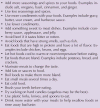Self-care strategies to cope with taste changes after chemotherapy
- PMID: 19273394
- PMCID: PMC2893729
- DOI: 10.1188/09.onf.e47-e56
Self-care strategies to cope with taste changes after chemotherapy
Abstract
Purpose/objectives: To describe factors related to taste changes, to examine patients' use of a self-care suggestion sheet to manage taste changes associated with chemotherapy, and to identify potentially useful strategies for managing specific taste changes after chemotherapy.
Design: Quasi-experimental, pre/post design.
Setting: Four outpatient urban and suburban oncology centers in Illinois.
Sample: 42 patients who had received at least two cycles of chemotherapy previously identified to be associated with taste changes.
Methods: Pre- and postintervention survey of taste changes; patient education regarding self-care for taste changes.
Main research variables: Taste changes, taste change strategies, and self-care.
Findings: Most patients that reported taste changes had affected their ability to eat. Taste changes and strategies varied somewhat according to chemotherapy regimen. Avoiding strong-smelling or -tasting foods, eating blander foods, drinking more water with foods, oral care before eating, and eating smaller, more frequent meals were reported to help.
Conclusions: Taste changes are common in patients receiving cisplatin, carboplatin, or cyclophosphamide. At-risk patients may benefit from prechemotherapy teaching regarding specific taste change management suggestions. Use of a taste change suggestion sheet encouraged self-care, and counseling patients regarding strategies to deal with taste changes may help them during chemotherapy.
Implications for nursing: Nurses should incorporate patient education tools that promote self-care regarding the management of taste changes in patients with known factors that could affect taste early in their chemotherapy.
Figures
References
-
- Ackerman BH, Kasbekar N. Disturbances of taste and smell induced by drugs. Pharmacotherapy. 1997;17(3):482–496. - PubMed
-
- Ames HG, Gee MI, Hawrysh ZJ. Taste perception and breast cancer: Evidence of a role for diet. Journal of the American Dietetic Association. 1993;93(5):541–546. - PubMed
-
- Barsevick AM, Whitmer K, Nail LM, Beck SL, Dudley WN. Symptom cluster research: Conceptual, design, measurement, and analysis issues. Journal of Pain and Symptom Management. 2006;31(1):85–95. - PubMed
-
- Bernhardson BM, Tishelman C, Rutqvist LE. Chemosensory changes experienced by patients undergoing cancer cheotherapy: A qualitative interview study. Journal of Pain and Symptom Management. 2007;34(4):403–412. - PubMed
-
- Berteretche MV, Dalix AM, d’Ornano AM, Bellisle F, Khayat D, Faurion A. Decreased taste sensitivity in cancer patients under chemotherapy. Supportive Care in Cancer. 2004;12(8):571–576. - PubMed

